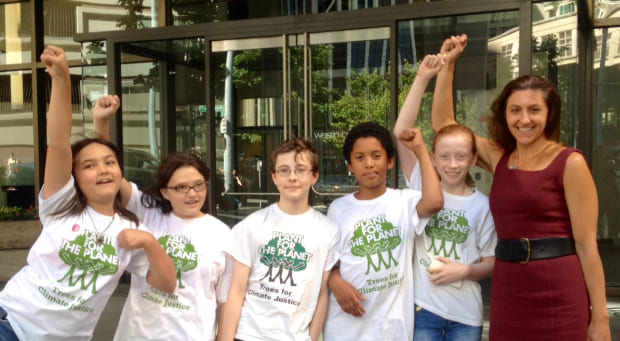- Home
- Kids VS Global Warming

Parents & Grandparents Fasting for The WA Climate Kids: Fighting for their Future
24 people have fasted for 3 days in advance of today’s public hearing on Washington’s Department of Ecology Inadequate Draft Clean Air Rule! Please come and speak out! Current information is available from this Facebook page: The WA Climate Kids: Fighting for their Future
Here are various news media articles about the fasting and today’s events:
- KUOW - KUOW Public Radio
- Cascadia Planet:Hungry for climate justice: Fasting at the Washington State Capitol
- The Stranger: Sixteen People Are Fasting on the Capitol Steps to Protest the Governor's Draft Clean Air Rule
- Common Dreams:
You can also get some updates and pictures from: 350 Seattle
Supreme Court hears climate case in Barrow
For University of Alaska Freshman Nelson Kanuk, climate change is not an abstract concept but something that directly affects his family, his home, his community, and his daily life. Raised in Kipnuk, Alaska, he learned at a young age that being a steward of the land is intrinsic to existence.
“Growing up both my parents and my grandparents stated how important it is to take care of the land,” Kanuk said. “Not only developing but hunting and gathering, but we can’t overdo that. We have to have a balance of sustainability.”
Many of the people gathered on Thursday, Oct. 3 at the Barrow High School Auditorium would likely agree with that statement. Barrow and Kipnuk, while hundreds of miles from each other, are both coastal communities who have a mostly Alaska Native population that depend on subsistence hunting and gathering. On Thursday afternoon the Alaska State Supreme Court convened in Barrow, Alaska to hear the case Nelson Kanuk, et. al., v. State of Alaska, Department of Natural Resources.
Mentioning several recent instances in which residents of Alaska have directly been affected by climate change, the attorney arguing for the appellants, Brad D. De Noble, spoke to the rapid changes that are apparent throughout the state. Bringing up thousands of walruses packed dangerously close together near Point Lay, residents of St. Lawrence Island unable to access food and Kanuk’s loss of his home to flooding just this spring, De Noble made it clear that certain resources are so essential and critical that they lay as public domain.
There to assist in the appellant’s case was Julia Olson, who works with Our Children’s Trust, a nonprofit organization that is working nationally to draw attention to the issue of climate change and is part of the larger global TRUST campaign, which turns to the justice system to seek exactly that.
justice for what many deem an unjust destruction of public land and natural resources that should be constitutionally protected under the Public Trust Doctrine.
The attorney arguing for the Appellee State of Alaska was Seth Beausang, who argued that this case cannot be decided by a single judge and group of plaintiffs. Beausang also brought up that this case is a political question argument and more of a global than state problem.
Drawing a large crowd of community members and high school students, the case presentation lasted less than an hour but afterward, the attorneys and appellants took questions from the audience.
Katherine Dolma, a 17-year-old high school senior from Homer, Alaska, is one of the appellants in the case. Dolma spoke to the view that climate change is a much bigger problem than the courts, and being involved in this case is one way to do something about a very pressing problem.
“This is a way to make a bigger impact and have the issue addressed at a larger level,” Dolma says.
Living in Homer, she has seen a visible receding of Six Glaciers in her lifetime.
When Kanuk and Katherine Dolma return to their respective communities, they will certainly engage their peers in dialogue about the case and the pressing severity of climate change. Although just one aspect of their busy lives, their tenacity is apparent in the eagerness and passion with which they discuss this case. Both teens also acknowledged that their involvement in this case was changing their lives in subtle yet significant ways.
About climate change, Dolma said, “A lot of people, they can see it, but they can’t accept that they can do something to help it. And I feel like that’s a really big step. First you have to see it and understand what it is and that it is happening but also that it’s not for someone else to deal with, it’s not for the state to deal with, it’s not for the government to deal with, it’s not for other countries to deal with it, we each have to do something about it if it’s going to change.”
Food for Thought …
"I had a very simple view of human behavioral change when I wrote The End of Nature back in 1989. I thought people would read my book, and then they would change." - Bill McKibben
1989 was a long time ago. Now is our time to take action!













